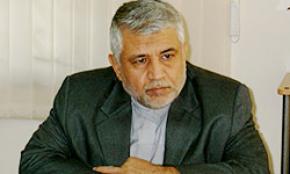ID :
198429
Mon, 08/01/2011 - 09:22
Auther :
Shortlink :
https://www.oananews.org//node/198429
The shortlink copeid
Iran Warns about Dire Consequences of US-Afghan Deal for Global Security

TEHRAN (FNA)- A senior Iranian diplomat reiterated Tehran's strong opposition to any strategic pact between Washington and Kabul on the extension of the US military mission in Afghanistan, warning that deployment of alien troops in a regional country would pose a serious threat to the entire world security.
"Endorsement of this deal not only threatens the regional countries but also is dangerous for the global security," Head of the Afghanistan Headquarters at the Iranian Foreign Ministry Mohsen Pak-Ayeen underlined on Sunday.
Pak-Ayeen further pointed out that Washington is seeking to contain and threaten Russia and China through the deal with Kabul, and added, "The impacts and aftermaths of security race and rivalry among the big powers will cause disorder in global security."
He further reminded that the 10-year-long presence of the foreign forces in Afghanistan has yielded no result as it has failed to establish peace and security in the country, and said unfortunately aliens lack the necessary might and power for fulfilling their undertakings with regard to Afghan security and reconstruction.
Iran, along with other regional countries, has many times urged a complete pullout of foreign forces from the region, describing it as the only way to restore peace and tranquility in this part of the world.
Tehran has frequently warned that the military presence of the western powers in Afghanistan has deteriorated problems, including drug cultivation, production and trafficking, in the war-ravaged country.
Iran, which leads international efforts in fighting drug networks and traffickers according to the UN statistical figures, says that drug production in Afghanistan has undergone a 40-fold increase since the US-led invasion of the country in 2001.
While Afghanistan produced only 185 tons of opium per year under the Taliban, according to UN statistics, since the US-led invasion, drug production has surged to 3,400 tons annually. In 2007, the opium trade reached an estimated all-time production high of 8,200 tons. Afghan and Western officials blame Washington and NATO for the change, saying that allies have "overlooked" the drug problem for ten years since they invaded the country.
"Endorsement of this deal not only threatens the regional countries but also is dangerous for the global security," Head of the Afghanistan Headquarters at the Iranian Foreign Ministry Mohsen Pak-Ayeen underlined on Sunday.
Pak-Ayeen further pointed out that Washington is seeking to contain and threaten Russia and China through the deal with Kabul, and added, "The impacts and aftermaths of security race and rivalry among the big powers will cause disorder in global security."
He further reminded that the 10-year-long presence of the foreign forces in Afghanistan has yielded no result as it has failed to establish peace and security in the country, and said unfortunately aliens lack the necessary might and power for fulfilling their undertakings with regard to Afghan security and reconstruction.
Iran, along with other regional countries, has many times urged a complete pullout of foreign forces from the region, describing it as the only way to restore peace and tranquility in this part of the world.
Tehran has frequently warned that the military presence of the western powers in Afghanistan has deteriorated problems, including drug cultivation, production and trafficking, in the war-ravaged country.
Iran, which leads international efforts in fighting drug networks and traffickers according to the UN statistical figures, says that drug production in Afghanistan has undergone a 40-fold increase since the US-led invasion of the country in 2001.
While Afghanistan produced only 185 tons of opium per year under the Taliban, according to UN statistics, since the US-led invasion, drug production has surged to 3,400 tons annually. In 2007, the opium trade reached an estimated all-time production high of 8,200 tons. Afghan and Western officials blame Washington and NATO for the change, saying that allies have "overlooked" the drug problem for ten years since they invaded the country.





